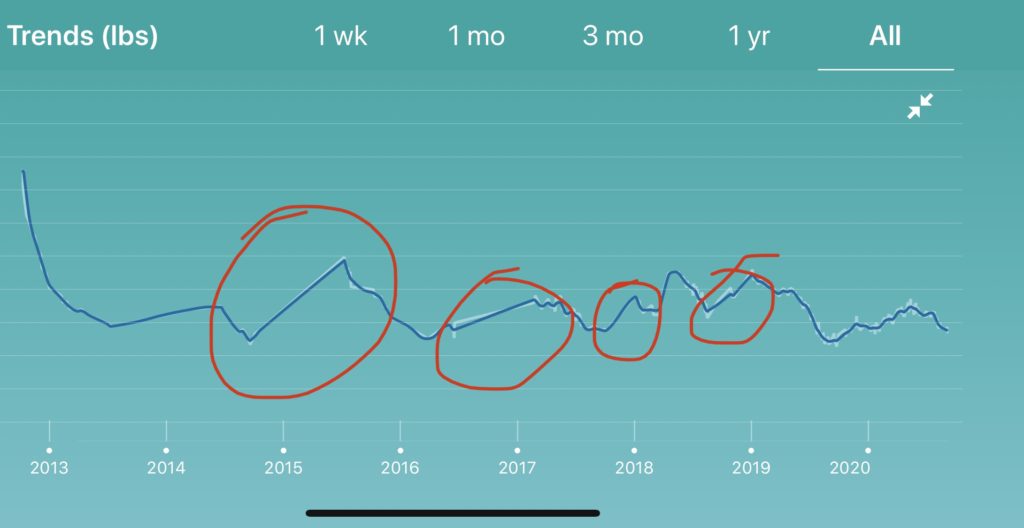7 good habits that stuck (and 3 that I’m still working on)
Habits are strange and beautiful things. They’re sometimes really hard to form or break, and yet they are absolutely key to living a successful life.
We simply do not have enough willpower in reserve to do all the things we know we need to do.
So, the brain forms habits to offload the task of “choosing”.
Think of habits like train tracks. Once you’ve done the work to lay them down, you no longer have to steer … just push ahead, and the tracks will guide you directionally.

Unfortunately, not all habits are good. Our decision fatigue and limited willpower makes it incredibly easy to fall into bad habits.
I’ve spent the better part of the last decade trying to break my bad habits and form good ones to replace them.
And although I can’t claim to have bested my demons completely, I’ve made some progress in some key areas that I feel have set me up for success on autopilot.
It’s worth noting that this wasn’t necessarily easy. But there are ways to make it less hard, and I’ve tried most of them to varying degrees of success. Perhaps that would be a good subject for another post in the future.
So, here are 7 good habits that I’ve managed to make stick, and 3 that I’m still working on.
1. Waking up at 5am
I wrote about the decision to wake up at 5am recently, so I won’t repeat myself too much, but this is one that I’m particularly proud of, since I’m a night owl by nature.
Giving myself this extra time alone every morning actually enables many more habits (a keystone habit), so I felt like mentioning this one first made a lot of sense.
2. Tracking every dollar
Since I’m up at 5am, and after I’ve given myself a reward of quiet coffee time and a little brainless web surfing, I get to spend a little time looking at all the previous day’s spending, categorizing it, and making mental notes of the categories where I’m approaching my limits.
The point of a budget is to know where you want your money to go, but the only way to measure success is to track where your money is actually going.
And by looking at my money situation every single morning, I get the peace of mind of knowing exactly where I stand when I start my day.
A secondary benefit of this is that I’ve caught fraudulent spending, unnecessary subscriptions, and unpaid bills on more than one occasion.
When it comes to personal finance, ignorance is your enemy. You can’t fix a problem you don’t know about, so the first step to making better decisions with money is actually knowing where you’re spending it.
I find that by doing this every day (as opposed to weekly, for instance), I’m better able to remember what was purchased, so I can accurately categorize it. Categorizing multiple days of purchases at a time just never really worked for me.
So, I do it daily. It takes no more than 5 minutes, and it’s absolutely worth it.
3. Paying myself first
Related to #2, but I only do this twice a month (on paydays).
The reality is that if the money is there, we’re probably going to find a way to spend it.
So why not treat savings and investments like a bill?
This tip is on pretty much every clickbait list of “X ways to become rich” on the internet … and for good reason. It works.
You, your family, your goals … these are important things. I had to stop treating them like an afterthought, only getting contributions if there was money left over at the end of the month.
I now treat payday differently. My employer sends money to my 401K automatically. I contribute to Roth IRA accounts for myself and my wife. We put a set amount of money aside to save for things like replacing a vehicle, travel/vacations, and Christmas gifts. If we’re planning something like a home improvement project, we have an account for that too.
4. Weighing myself every day
By around 8:30am, my family is usually up and eating breakfast.
So I head down from my office and am able to do more “noisy” routines.
Over the years, my weight has fluctuated quite a bit. In any given 12 month period, my weight might swing 10-15 lbs.
I’ve tracked my weight for about 8 years now, and one thing that I noticed when looking at my logs from all these years is that the biggest swings upward are correlated with large blocks of unaccounted time. That is, months of not tracking my weight.

Notice all the straight lines? Those were periods of time where I stopped my daily weigh in.
Again, ignorance is the enemy here. Not knowing does me no good.
For the last year or so, I’ve captured my weight nearly every day. As you can probably see, this has been my most consistent year to date. Hard to argue with that.
5. Drinking lots of water
After I weigh in, I take a handful of supplements (fish oil, multivitamin, etc.) and fill 3 large bottles with water. I then drink one of them.
I don’t savor it. I just gulp it down.
The bottles sit on the countertop at the bottom of the stairs that lead to my office. I walk past them several times per day, and they taunt me if left full.
So I drink them.
I’ve been training for this kind of completionism since I was a wee lad playing video games. I’m not a quitter.
Do I need that much water every day? Probably not. But over-hydration makes me feel better than under-hydration.
Plus, a large bottle of water fill the belly, and can oftentimes defer a craving for a snack.
So, lots of good reasons for this one.
6. Walking every day
My job has me sitting, looking at a computer screen, and just generally not being active for most of the day.
Not good.
The easiest way I’ve found to counteract this negative reality is by carving out time, usually sometime between 10:30am and noon, to take a walk.
Sometimes I walk outside, but most days I just hop on a cheap treadmill I bought second hand for about $100. It’s seriously NOT fancy.
And because walking takes almost no thought, I’m able to use that time to do other things like listen to e-books, catch up on email, attend meetings (where I don’t need to talk), or even just be alone with my thoughts.
7. Resistance training
I’m no bodybuilder. But when we built our house in 2016, I made sure to include a space where I could have a simple weight set … some plates, dumbbells, and a squat rack.
It cost less than you might think, about $600 for the basics. It’s paid for itself many times over.
At 4pm most weekdays (unless I have a meeting during that block), I head down to the basement and spend a little time lifting heavy things, usually while listening to some music.
Like I said, I’m no bodybuilder. Progress is slow, but it’s time well spent. It burns some extra calories, but more importantly, it gives calories a job … build and maintain muscle.
Failures
While I have successfully integrated these 7 good habits into my daily routine, I’ve got some notable failures to share too.
1. Diet
I’ve yet to find a diet that I’m able to stick with long term.
I don’t do “moderation” very well, so I’m usually in “feast or famine” mode when it comes to diet.
I’d really like to find something the whole family could adopt, and that also supports my goals of longevity and slowly building lean muscle without putting on unnecessary body fat.
Or maybe it’s not that I haven’t found the right diet, but that I haven’t had the necessary discipline to stick with one.
Either way, I’m still working on this one.
2. Reading
I must confess, while I do listen to audiobooks while walking, I also listen to a lot of music, or watch a TV show, or surf YouTube.
I’d really like for my walking time to be exclusively used for audio learning, not mindless entertainment.
Still working on this one, too.
3. Writing/Blogging
Since June, I’ve published a new blog post every week, with the exception of 2 weeks for vacation.
Want to know a secret? I wrote a lot of those posts in a single weekend. Or at least the first drafts.
I really want to incorporate writing into my daily routine, but I’ve yet to figure out how to do this effectively. I have some ideas, but the first step is always the hardest for me.
Got tips for me?
I’d love to know what good habits you’ve been able to form. I’m always looking for my next challenge, so if you have ideas, let me know!